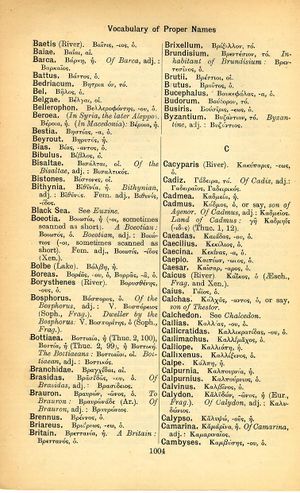Calypso
Νόμιζε σαυτῷ τοὺς γονεῖς εἶναι θεούς → Tu tibi parentes alteros credas deos → Bedünke, dass dir deine Eltern Götter sind
English > Greek (Woodhouse)
Καλυψώ, -οῦς, ἡ.
Latin > English (Lewis & Short)
Călypso: ūs (e. g. Tib. 4, 1, 77; Plin. 3, 10, 15, § 96; Serv. ad Verg. A. 3, 171:
I Calypsonis, App. M. 1, p. 107; Macr. S. 5, 2, 10; acc. regularly Calypso, Ov. P. 4, 10, 13; cf. Quint. 1, 5, 63; Plin. ap. Charis. p. 102 P.; Prisc. p. 685 ib.; Rudd. I. p. 60, n. 84; but Calypsonem, Liv. And. ap. Prisc. l. l., and Calypsonem, Pac. ib., and ap. Charis. p. 47 P.; Caes. ap. Quint. 1, 5, 63; Macr. S. 5, 2, 10), f., = Καλυψώ, a nymph, daughter of Atlas (or Oceanus), who ruled in the Island Ogygia, Plin. 3, 10, 15, § 96 (acc. to Mel. 2, 7, 18, erroneously, in Aeaea), in the Sicilian Sea, she received Ulysses as a guest, bore by him Auson (v. Auso-nes), and, with the greatest unwillingness, allowed him to continue his voyage, Tib. 4, 1, 77; Ov. P. 4, 10, 13; Cic. Off. 1, 31, 113; Prop. 1, 15, 9; 2 (3), 21, 13.

